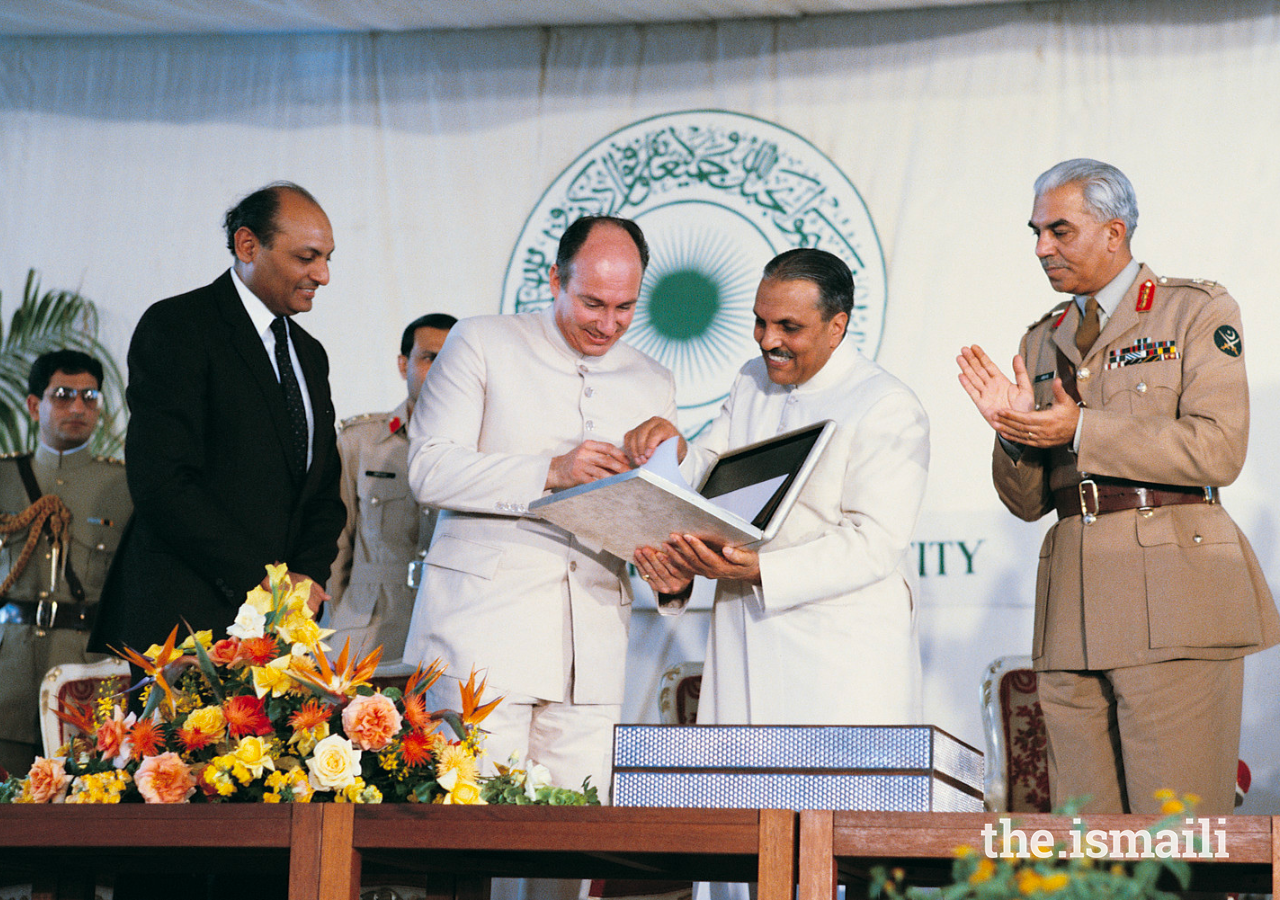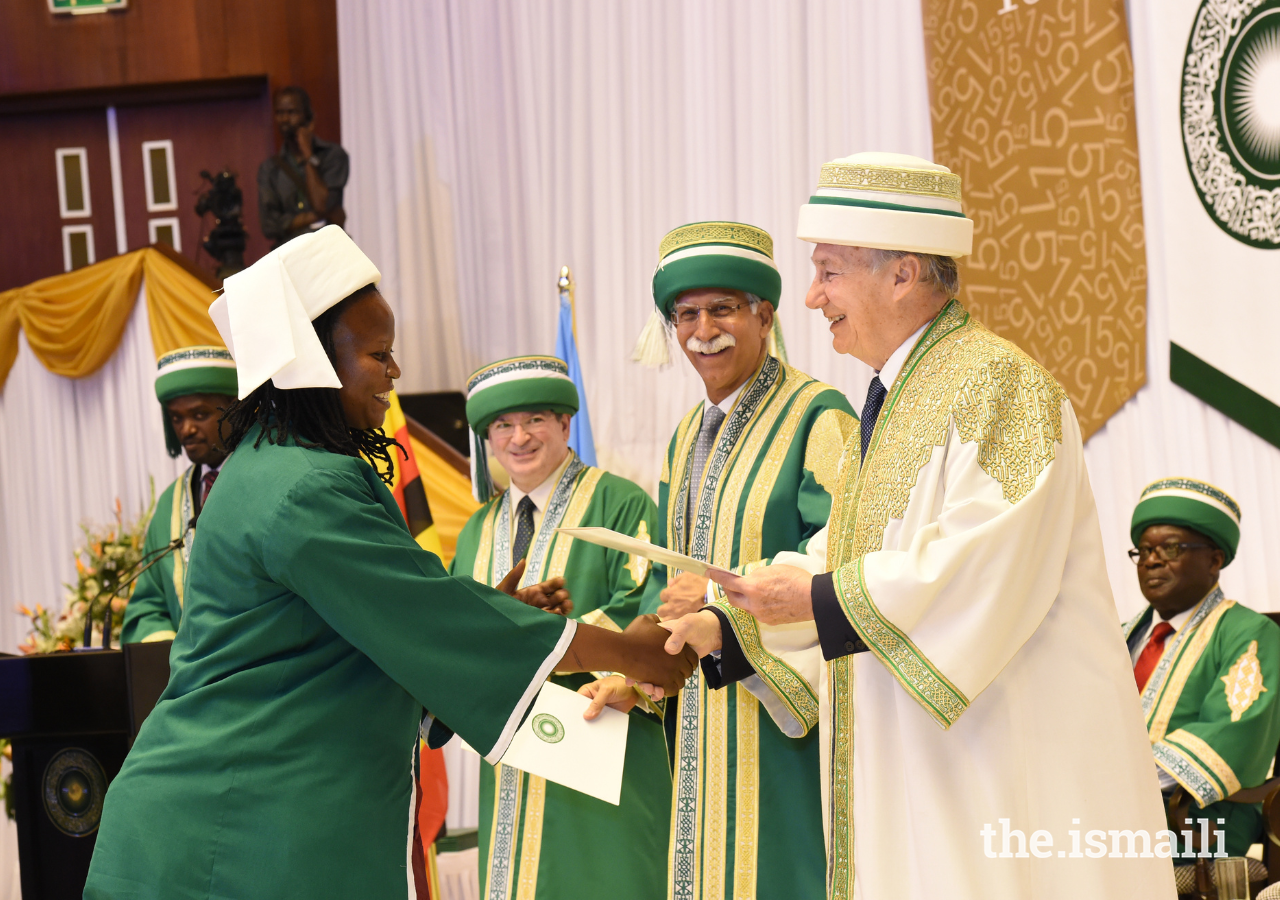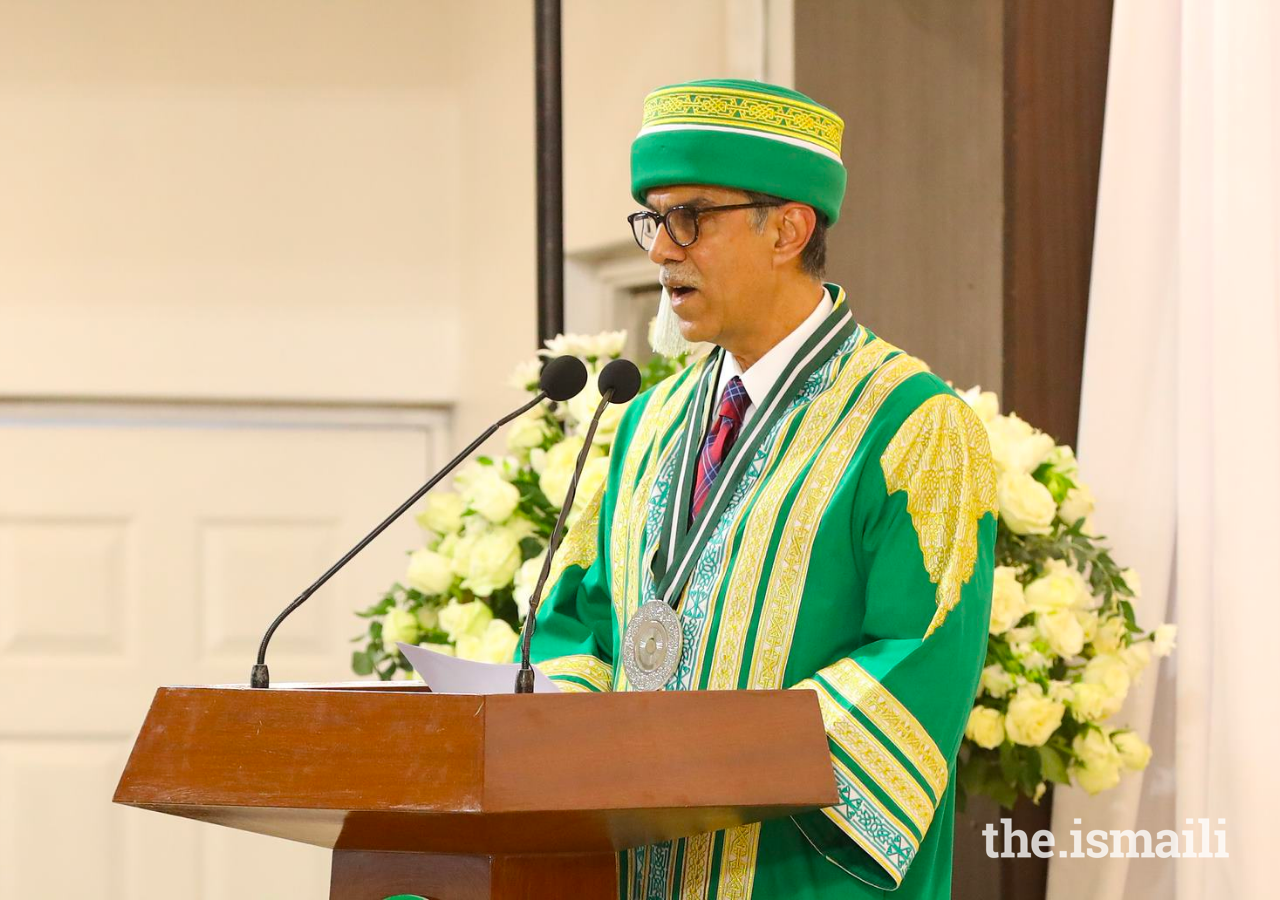Addressing the gathered guests, he outlined his aspirations for what the University should stand for in the years to come.
The year 2023 marks 40 years — over half the lifetime of Pakistan — since AKU was granted its charter. Over this time, the University has made an outsized positive contribution to the fields of education and healthcare in the communities it serves. It has achieved this, in large part, thanks to the driving force emanating from AKU’s Office of the President.
Alongside the Institute of Ismaili Studies and the University of Central Asia, the Aga Khan University builds on the historic traditions of learning and educational excellence, including the legacy of Al-Azhar University, founded by the Fatimid Imams a thousand years earlier.
“That legacy has long been an inspiration to me,” said Hazar Imam during his convocation address in 2013, “even from the time when I succeeded my grandfather as Imam in 1957.”
Laying strong foundations
An important element of AKU’s vision since its founding has been to promote the welfare and advancement of women. The first academic unit, which predates the University itself, was the Aga Khan School of Nursing.
“Hazar Imam’s aspiration was to establish an institution of the highest quality, measured on international best practice,” said Shamsh Kassim-Lakha, about the School of Nursing which opened in 1980. “It was not a university at the time that he established it, but clearly he had this evolution in mind.”
Having helped to lay much of the groundwork for the School and the Hospital before it, Shamsh was asked to be AKU’s inaugural president in 1983, and was charged with turning aspirations into reality. An early challenge was to attract the requisite talent, for an institution is only as good as its people.
“We recruited a lot of people — members of the Jamat and others — who went on to serve in senior roles at AKDN. They started their careers with AKU. At first, some expatriates didn’t have a clue where Pakistan was or Karachi was,” revealed President Shamsh. “I'm very proud of the men and women who worked with us in the early years and stayed the course. They were brilliant, committed people.”
It was an ambitious venture, but a much needed one. The healthcare situation in Pakistan was less than ideal — infection rates were high, diagnostic capacity was very low, there was no system to keep medical records. This began to change, with the growth of the Aga Khan Hospital in Karachi, and Hazar Imam’s insistence on high standards of quality.
“His vision was also for AKU to be a role model as a university, and as a hospital,” said President Shamsh, who explained that AKU was the first private university not only in Pakistan, but in all of Asia. “It set the trend across India, Bangladesh, Pakistan and onwards to the Middle East.”
There was also an added benefit. The institution helped to positively change the perception of nursing as a profession, and went on to become a transformative force for the status of women in Pakistan and East Africa. Nurses in these parts of the world are increasingly, and rightfully, considered an integral feature of forward-looking public health systems, thanks in large part to AKU. There are now 60 nursing schools in Pakistan, 53 of them headed by AKU alumni.
Influenced by the great Muslim centres of learning, the Aga Khan University is proud of its heritage and its mandate, inspired by the ethics of Islam. “The charter says ‘AKU shall be a Muslim University,’” explained President Shamsh, who helped to finalise the design of the University’s seal.
In many parts of South Asia and East Africa in particular, AKU’s seal has become an instantly-recognised visual representation of the institution’s values. At the centre of the seal is a star, or sun — a universal symbol for the enlightenment that education provides. The light emanating from the star is also symbolic of Nur, or Divine Light. The star incorporates 49 points to commemorate the University's founding by Mawlana Hazar Imam.
AKU’s heritage also provided the motive for it to establish the Institute for the Study of Muslim Civilisations (ISMC) in London in 2002. ISMC is founded on a scholarly and pluralistic approach to, and understanding of, Islam and Muslim cultures. Its mission is to participate in the creation and dissemination of knowledge about Muslim societies in all their historic and present-day complexity and diversity.
Meanwhile, as AKU began to gain a strong reputation in Pakistan and beyond, collaboration with other institutions became a possibility, and in some cases, a priority.
In Kabul, AKU was asked to operate Afghanistan's leading maternal and child hospital, the French Medical Institute for Mothers and Children (FMIC). The unit was established in 2006 to address a tragic gap in maternal and child health in Afghanistan, following political instability in the country. Today it offers world-class medical services to all age groups, and has been a pioneer in eHealth, increasing access to quality healthcare across the wider region.
The inaugurations of ISMC and FMIC also marked the acceleration of AKU’s global expansion.
Expanding and extending
In the mid-2000s, the pace of technology was accelerating, globalisation was in full force, and perceptions of Islam were changing in many parts of the world. Throughout this time, the Ismaili Imamat had been building institutions to combat ignorance, promote pluralism, and enable the long-term development of the Jamat and its neighbouring communities.
Hazar Imam envisioned the Aga Khan University playing a major role in this endeavour. Enter Firoz Rasul, who was appointed as AKU’s second president in 2006 to oversee the next phase of the University’s journey. Firoz had previously helped to build and lead several business enterprises in North America and had also served as President of the Ismaili Council for Canada.
His main task at AKU was to pursue the sustainable growth of the University. This brought its own set of challenges, namely sourcing sufficient capital and funding to plan the infrastructure, and recruiting qualified human resources to deliver new programmes, all while navigating cumbersome government approval processes.
“Through long term planning based on the guidance of the Chancellor and the Trustees, including Princess Zahra,” said President Firoz, “methodical effort was expended, including in conjunction with other AKDN agencies which supported this effort.”
During his term of office, he led AKU’s further expansion into Kenya, Uganda, Tanzania, Afghanistan, and the United Kingdom, establishing new campuses through acquisition of land, master-planning for sites, design of facilities, and construction of buildings. This expansion was an integral part of the long-term vision to establish several new graduate professional schools, institutes, and centres of excellence to AKU’s growing portfolio.
The graduate schools, said Hazar Imam in his 2013 convocation address, “will work in fields of particular relevance to developing societies.” Through their teaching and research, he continued, “they will also develop able and ethical leaders who can strengthen the role of civil society among the people we seek to serve.”
“These new graduate schools are exciting,” he added emphatically.
Special Thinking Groups were set up in each respective field, to draw upon best-practice and global expertise. Cultivating cross-border relationships was to become a theme of President Firoz’s tenure.
“The establishment of strategic partnerships and relationships with international Universities, are securing larger amounts of competitive funding.” said President Firoz, “This is allowing AKU to train and develop the next generation of researchers.”
Over the course of 15 years at the helm, he helped to secure over US $1bn in funding from private donors, multi- and bilateral agencies, research grants, and concessional financing, as well as world class faculty and leadership to propel the University to greater heights.
AKU has initiated new programmes in teacher education, journalism, early childhood development, and public policy. Over 19,000 AKU alumni, including doctors, nurses, teachers, and school managers — two-thirds of whom are women — now make up a respected community of leaders who are successfully raising standards in their industries and across their regions.
The leadership team also helped to secure international accreditation to confirm the standards in AKU’s academic programmes and hospitals, and strengthen research across all disciplines. This led to increasing trust and satisfaction among patients and students alike. The AKU health system now serves more than two million patients annually, and is ranked among the leading universities in Asia, Africa and, in some fields, the world.
This is part of an effort to fulfil one of the key principles since its founding: relevance. AKU has made itself relevant not only through its high quality offerings but also through its broader mandate to serve the societies in which it operates. Environmental sustainability, for example, is a strategic priority for the University.
“In the design of campuses,” said President Firoz, “we strived to achieve environmental sustainability through pursuing gold standards for design and construction, operating practices that use cleaner energy sources such as solar, elimination of plastics and other polluting materials, reducing carbon emissions, and adopting natural materials instead of synthetic alternatives.”
When the Covid-19 pandemic slowed down the world in early 2020, the Aga Khan University kicked into a higher gear, assisting the capacity-building of government responses, and conducting clinical trials of vaccines and therapy drugs. Just as societies were emerging from lockdowns in 2021, the University was granted its Kenya charter and inaugurated its new University Centre. Standing proudly in the heart of Nairobi, the complex is a testament to AKU’s achievement in recent years.
But it’s not stopping there. Through its long-term vision, the institution remains ambitious and continues to symbolise forward progress.
Onwards and upwards
As our world grapples with today’s increasingly complex issues — disease epidemics, inequality, questions around sustainable growth, and the climate crisis — the Aga Khan University is playing a significant role in responding. Meanwhile, building the capacity to harness the potential of artificial intelligence, genomic medicine, and stem cell science, and apply these with creativity and imagination to tomorrow’s global challenges, will form an important part of its future mandate.
The person entrusted to lead AKU into this exciting future is Dr Sulaiman Shahabuddin, who became the University’s third president in 2021. Princess Zahra conferred the Presidental Medal on him at last year's Convocation ceremony.
President Sulaiman brings a wealth of experience to the role, having spent many years contributing to AKU’s various successes in both East Africa and Pakistan. Dr Sulaiman joined in 1986 as a trainee purchase officer, and rose through the ranks, witnessing first-hand AKU’s phenomenal growth along the way.
In a recent interview with The Ismaili TV, he noted the weight of responsibility that the role entails, and the generous guidance that the Chancellor provides. “What I find fascinating is Hazar Imam’s ability to look at the big picture — many many generations ahead — but then come back to the detail, and then go back to the big picture,” he said.
“And the big picture is something phenomenal.”
In his recent convocation addresses, Mawlana Hazar Imam outlined his aspiration for AKU to evolve into a multi-disciplinary research institution active in the humanities and social sciences, aiming to carefully balance complex innovation on the one hand with long-standing traditions and culture on the other. The plan is to establish new graduate professional schools, institutes, and centres in different disciplines to help societies address key questions and meet the needs of AKU’s host regions.
“The liberal arts, I believe, can provide an ideal context for fostering interdisciplinary learning, nurturing critical thinking, inculcating ethical values, and helping students to learn how to go on learning about our ever-evolving universe,” said Hazar Imam in 2013.
Extending into the liberal arts has long been part of AKU’s ambition, dating back to the Chancellor’s Commission in 1994. The groundwork had been back then, with contributions from both previous presidents and their teams ever since. Now is the time to bring it to life: to train and produce cutting-edge innovation, critical thinking, and policy analysis.
One major aspect of this expansion has been entitled the Faculty of Arts and Sciences (FAS). “I think the arts and sciences programme will have the same transformative capacity as the School of Nursing had,” President Sulaiman said.
“Its graduates will have the analytical skills, communications skills, leadership skills and the capacity for innovation, giving them the tools to succeed across multiple career pathways.”
FAS aims to educate youth who will become future leaders — leaders who will drive positive change, invigorate civil society, champion good governance, promote social and economic development, foster appreciation for pluralism, and encourage ethical behaviour. They will therefore be well-equipped to respond to the needs of the time, which has always been the goal.
“The Aga Khan University is part of the history of the Ismaili Imamat and the passion for education that stretches over more than a thousand years,” says President Sulaiman, referring to the continuum of progress that AKDN strives to achieve.
In its short history, the AKU has succeeded in improving quality of life in the developing world and beyond — through world-class teaching, research, and healthcare delivery. It also empowers women and the disadvantaged, collaborates with local and global partners, and generates new knowledge to solve problems that affect millions of people.
All this is due in large part to the many people involved with the University over the years, including its three presidents, countless members of the Jamat, and its founder and Chancellor, Mawlana Hazar Imam. As President Shamsh concludes, “It's just been a privilege that the Imam has given us the gift of service. It's a gift that we’ve been given, and we’re very fortunate to serve and contribute.”










